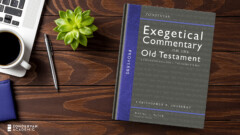
Today we continue our project of reading through John Stott’s classic work The Cross of Christ. We’ve now moved onto Part III which discusses “The Achievement of the Cross.” Here Stott begins to move from the event itself to the consequences, “from what happened on the cross to what was achieved by it.” The Bible sums this up in three words: salvation, revelation and conquest. First up is chapter 8, “The Salvation of Sinners.” The chapters that follow will discuss revelation and conquest.
The Salvation of Sinners
Here is how Stott introduces the ideas he wants to discuss in this chapter.
It would be hard to exaggerate the magnitude of the changes that have taken place as a result of the cross, both in God and in us, especially in God’s dealings with us and in our relations with him. Truly, when Christ died and was raised from death, a new day dawned, a new age began.
This new day is “the day of salvation” (2 Cor 6:2), and the blessings of “such a great salvation” (Heb 2:3) are so richly diverse that they cannot be neatly defined. Several pictures are needed to portray them. Just as the church of Christ is presented in Scripture as his bride and his body, the sheep of God’s flock and the branches of his vine, his new humanity, his household or family, the temple of the Holy Spirit and the pillar and buttress of the truth, so the salvation of Christ is illustrated by the vivid imagery of terms like propitiation, redemption, justification and reconciliation, which form the theme of this chapter.
Those four terms form the theme and the structure, allowing Stott to progressively reveal the salvation accomplished at the cross. “They are not alternative explanations of the cross, providing us with a range to choose from, but complementary to one another, each contributing a vital part to the whole. As for the imagery, propitiation introduces us to rituals at a shrine, redemption to transactions in a marketplace, justification to proceedings in a court of law, and reconciliation to experiences in a home or family.” Substitution is not a theory of the atonement but the foundation of all of these words and concepts.
And so Stott turns to each of them. Let me share just three great quotes.
The reason why a propitiation is necessary is that sin arouses the wrath of God. This does not mean (as animists fear) that he is likely to fly off the handle at the most trivial provocation, still less that he loses his temper for no apparent reason at all. For there is nothing capricious or arbitrary about the holy God. Nor is he ever irascible, malicious, spiteful or vindictive. His anger is neither mysterious nor irrational. It is never unpredictable, but always predictable, because it is provoked by evil and evil alone. The wrath of God … is his steady, unrelenting, unremitting, uncompromising antagonism to evil in all its forms and manifestations. In short, God’s anger is poles apart from ours. What provokes our anger (injured vanity) never provokes his; what provokes his anger (evil) seldom provokes ours.
That last sentence gives us all an “ouch” moment, I think. Here is another good quote:
Our body has not only been created by God and will one day be resurrected by him, but it has been bought by Christ’s blood and is indwelled by his Spirit. Thus it belongs to God three times over, by creation, redemption and indwelling. How then, since it does not belong to us, can we misuse it? Instead, we are to honor God with it, by obedience and self-control. Bought by Christ, we have no business to become the slaves of anybody or anything else. Once we were slaves of sin; now we are the slaves of Christ, and his service is the true freedom.
In conclusion, at the end of the chapter, he says this:
Substitution is not a “theory of the atonement.” Nor is it even an additional image to takes its place as an option alongside the others. It is rather the essence of each image and the heart of the atonement itself. None of the four images could stand without it. I am not of course saying that it is necessary to understand, let alone articulate, a substitutionary atonement before one can be saved. Yet the responsibility of Christian teachers, preachers and other witnesses is to seek grace to expound it with clarity and conviction. For the better people understand the glory of the divine substitution, the easier it will be for them to trust in the Substitute.
Amen to that!
Next Week
For next week please read chapter 8, “The Revelation of God.”
Your Turn
The purpose of this program is to read these books together. If you have something to say, whether a comment or criticism or question, feel free to use the comment section for that purpose.









